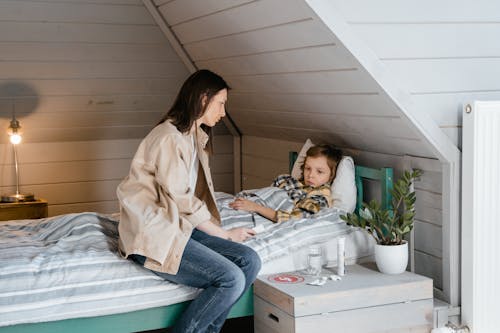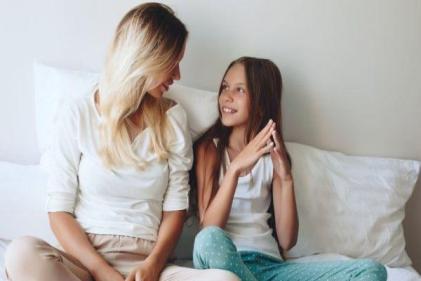A study by Laya Healthcare looked into the health of children aged between 9-12 years old, examining their physical, nutritional, and mental health, which revealed that 68% of parents found their child to display symptoms of anxiety. Low moods are normal now and again, but parents are reporting that their child seems to be upset more easily since the pandemic and that reinforcement is needed to help combat poor mental health in our children,
It’s no secret that the last few years have had a negative impact on almost all of us and especially our mental health. But to hear of these statistics in our children makes us want to take action. But how can we be there to support our children’s mental health in a practical way on their level?
Emphasise importance of wellbeing

How to look after ourselves is a skill we all learn growing up, but learning to incorporate wellbeing into looking after ourselves is something more than the basic hygiene, diet and social skills. Wellbeing with things like food is having a healthy relationship with food – having a balanced diet, but also not being overly stringent or indulgent with food. Treating yourself now and again, but not bingeing.
It’s also about setting boundaries socially – if they’re burned out with school and activities, teach them to guard their mental and physical health with boundaries. Maybe they have to drop one hobby for a little while in order to rest and care for the body and mind. Teach them that they can to say no to things now and again in order to preserve some mental and physical energy. These are all important extra skills to have to cultivate wellbeing that go beyond their basic life skills.
Practice gratitude together

It can be so easy to slip into a negative outlook on life. One difficult week can set someone into a funk that takes a month to come out of. It’s important to practice looking on the bright side – not false positivity or pushing down negative feelings, because those are important to express too, but in seeing that the world doesn’t fall apart because of one bad thing.
Many of us have started journals over the last few years on mindfulness, positivity and gratitude, and while your child may not want to take part in something that feels just a little too much like school, trying out a verbal exercise each night before bed might be more their speed. If you want them to appreciate and be grateful for things in their lives, try listing three things you’re both grateful for before going to sleep. Even something as small as a fun moment with a friend that day or a nice dinner. By remembering these small things, it rewires their brains to look out for fun and enjoyable moments throughout the day. And even if it was a bad day, they still have family who love them, a roof over their head and a meal on the table – three things to be grateful for every day.
Have designated worry time

Family life is busy – sometimes too busy. With everything happening at full speed during the week and weekends are for fun and socialising and catching up, it can feel like there’s no down time to just breathe and talk about mental health.
We like to think that if something is bothering our child, they’ll just tell us – and some children will. But if a child is looking to discuss something more private but doesn’t know how to approach you during the busy day-to-day, you may end up never hearing about it at all.
Setting aside a little time each week or even every other day for each child to air any problems they have, or even just to check in can make them feel like there’s a designated space for them to share what’s going on with them. This tactic will help in the future when they become a more reserved and secretive teen, having already established a space during the week when they can come to you and have an open line of communication. It will only make the relationship stronger and help you to catch any problems that much sooner.
Plan selfcare/relaxation/fun time

Since some of us are still working from home, I think a lot of us have finally understood the importance of setting boundaries around our down time. Of carving out a piece of our day that is specifically our enjoyment and to unwind, to stop thinking about work and responsibilities entirely so we’re able to rest and recharge.
By setting that example for our children, we’re highlighting its importance and allowing them to take time out for rest. It sows healthy boundaries between work and play, productivity and rest and allows them to truly unwind in whatever way works for them. That may be videogames or TV, something you’d rather maybe they not do. But as long as it’s not in excess, and it’s not harmful to them, it’s best to let them unwind in their own manner. It may not be the same as your bath and good book, but we’re all different.
Practicing positive outlooks

Visualisation is a powerful tool for the mind. Again, this is not about false positivity, but rather training the brain to look for the positives, rather than the negatives. If your child is a worrier who freaks out when a notebook gets left behind at school or a project is late, or a note forgets to be signed, talk them through it. Worry can become a lifelong habit that can morph into catastrophising, something many of us do.
Imagining the worst possible outcome isn’t always helpful – it can be easy for the situation to suddenly seem totally out of our control. But instead of jumping to that, try to talk them through the best case scenario – your teacher understand you left your notebook at school, everything works out fine, you do the homework tomorrow instead. Practice calming breathing techniques alongside this and the designated worry time to truly keep the line of communication open and allow for a better relationship, not only with you but with their own mental health.






